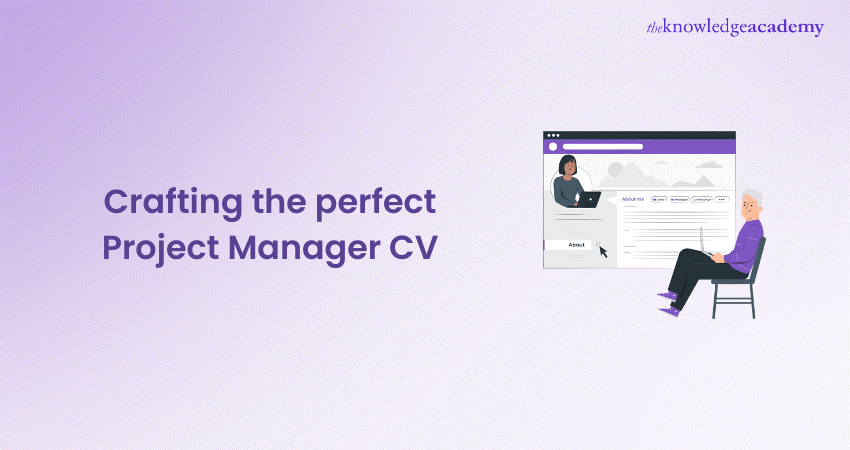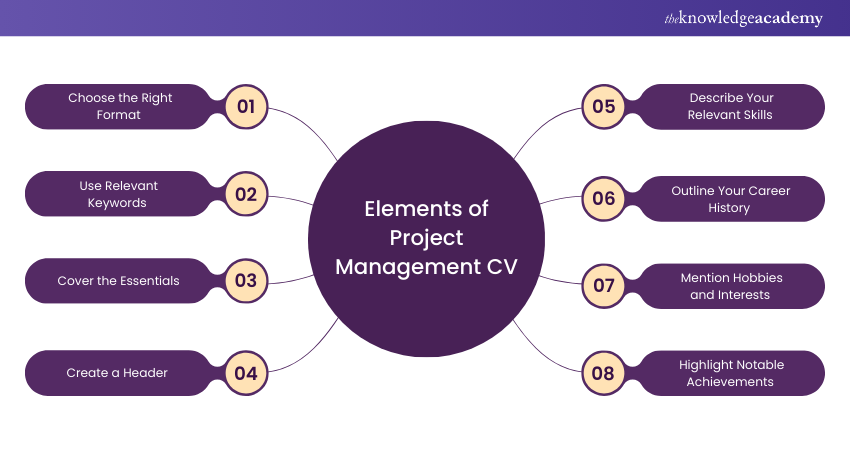We may not have the course you’re looking for. If you enquire or give us a call on 01344203999 and speak to our training experts, we may still be able to help with your training requirements.
Training Outcomes Within Your Budget!
We ensure quality, budget-alignment, and timely delivery by our expert instructors.

Project Management is the backbone of innovation ensuring that every project, no matter how complex, reaches its completion with precision and flair. With that in consideration your CV is the golden ticket to your contribution to Project Management’s ever-evolving world. A well-crafted Project Manager CV will help you navigate the sea of applicants and guide you to your dream job. This blog explores the best path to crafting a CV that showcases your managerial skills and experience and dazzles prospective employers
Table of Contents
1) Tips for writing effective Project Management CV
a) Choose the Right Format
b) Use Relevant Keywords
c) Cover the Essentials
d) Create a Header
e) Describe Your Relevant Skills
f) Outline Your Career History
g) Mention Hobbies and Interests
h) Highlight Notable Achievements
2) How to add your APM qualification onto your LinkedIn Profile
3) Conclusion
Tips for Writing Effective Project Management CV

Project Managers are crucial to an organisation’s success, making their skills highly sought after. Recruiters will be particularly interested in the specific projects you’ve managed, your training and certifications, your technical skills and methodologies. They will be focusing on key metrics such as budgets, deliverables and cost savings. The following tips will help your CV stand out
1) Choose the Right Format
You have several CV formats to choose from:
a) Chronological Order: Emphasises your work experience and its relevance to the open role.
b) Functional Order: Highlights your core competencies and credentials.
c) Combination Order: Merges elements of both chronological and functional CVs.
Choosing the right resume format depends on your career history and goals. A chronological order is ideal for those with a continuous work history, emphasising career progression. A functional order suits individuals with gaps in employment or those changing careers, focusing on skills. Furthermore, a combination order balances both approaches, highlighting relevant experience and key competencies.
2) Use Relevant Keywords
When you apply online for a Project Manager position, your CV may go through an applicant tracking system (ATS). This software scans your CV for specific keywords that match the job description, such as “budget” or “scope” to assess your relevant Project Management experience. If your CV contains enough of these key terms, the ATS will forward it to a recruiter.
To identify the right keywords, read through each job posting carefully before applying. Since each company, role and industry is unique, relevant keywords may vary. Consider these commonly used Project Management keywords and terms
a) Analysis
b) Budgeting
c) Business Case
d) Change Management
e) Client Communication
f) Data Analysis
g) Project Life Cycle
h) Quality Control
i) Resource Allocation
j) Risk Management
k) Roadmap
l) Scheduling & Planning
m) Scope Management
n) Specifications
3) Cover the Essentials
The great thing about CVs is that they are universal. They come with a few golden rules that always apply despite the content varying from applicant to applicant.
a) Keep It to One Page (If possible): Recruiters often have to review hundreds of applications daily, so a concise and clear CV is like a breath of fresh air to them. Even though two pages is fine, try keeping it to one page. Tailor your content for each job application. If necessary, consider removing any experience that is anything older than a decade to keep the length down.
b) Consider a Professional Summary: A resume summary can be helpful, especially if you're moving to a new industry. A brief introduction of two or three lines will connect your past experience with your future goals.
Take this example as reference
| Process-driven Project Manager with 12 years of experience leading multiple projects at a time, looking to transition into an internal role in the [industry name] space. Eager to utilise extensive budgeting, tracking, and roadmapping experience to seamlessly drive program initiatives from ideation to completion. |
c) Use Section Headings: Breaking your CV into clear sections will make it easy to scan. These sections include experience, education and technical skills. To enhance readability and visual appeal, make sure each heading is cantered, underlined or bold.
d) Proofread Thoroughly: After spending hours or days on your CV, it’s easy to miss small errors like missing dates or misplaced commas. Take a break before your final proofread, or you can get it reviewed by a trusted colleague or friend.
4) Create a Header
List your name and contact details at the topmost section of your CV. Ensure that you include your name, address, phone number and email address in a visible spot, so that hiring managers can easily contact you easily. You can consider making your header a larger font and centre-align it to make it more noticeable.
5) Describe Your Relevant Skills
Your CV is a golden opportunity to demonstrate to the recruiter how your experiences and skills align with the role you are applying for. It's highly advisable to include a blend of hard and soft skills to showcase your range as a strong Project Manager.
Hard skills are directly related to Project Management, such as proficiency with specific management software, while soft skills cover attributes like communication and leadership.
Hard skills such as vendor recruitment, financial planning, impact assessing, data modelling and client communication will strengthen your CV.
6) Outline Your Career History
It’s better to start with the most recent position and work backwards. Employers look for concrete facts, so outline your responsibilities and achievements as clearly as possible. Detail who you managed (including numbers), your methodologies, budget responsibilities, and types of projects handled.
a) Include Full Details: Provide the company name, job title, start and end dates (including months along with years). Employers want to see your career trajectory and identify any gaps in your employment history.
b) Explain Employment Gaps: It helps to offer brief explanations for any periods of unemployment to address potential concerns about your career continuity.
c) Reason for Leaving: Include sound reasons for leaving a position, especially if you have moved frequently or taken short-term contract roles. This helps pre-empt questions from employers about why you left a job and if there were any issues.
7) Mention Hobbies and Interests
You shouldn’t feel compelled to include this section by default. Many applicants omit it entirely nowadays. But if you choose to include something, ensure it is engaging and a potential conversation starter at the interview.
Avoid generic statements like “Travelling, socialising with friends, and watching films.” Instead, highlight unique hobbies or pastimes that set you apart. Sharing interesting and preferably creative activities can demonstrate your individuality and might even resonate with your interviewers, as they appreciate engaging personalities.
8) Highlight Notable Achievements
If you have worked on special projects or received awards, consider including an achievements section in your resume. For special projects, mention the budget, project type, and client if possible.
For awards, include the title, the year you received it, and a brief description if necessary. This section spotlights your accomplishments, demonstrating to hiring managers that you have excelled in your role and can bring valuable expertise to the job.
Confidently lead projects with our Project Management For Non-Project Managers Course – Register today!
How to add your APM qualification onto your LinkedIn Profile
Want to power up your LinkedIn account with your new APM qualification? These steps will help you:
1) Log in to your LinkedIn Account.
2) Scroll down to the ‘Accomplishments’ section.
3) Click on the ‘Plus’ option and choose ‘Certification’.
4) Fill in the ‘Certification name’ as ‘APM Project Management Qualification’ or ‘APM PMQ’.
5) For certification authority, start typing and from then choose ‘Association for Project Management’.
6) Fill in your license number (The license number is on your certificate) and choose ‘This certification does not expire’.
7) In the ‘Certification URL’ section, add the URL of your Knowledge Academy APM course.
8) Click save
Conclusion
In conclusion, when creating a Project Manager CV, you need to prioritise readability, clarity and elimination of typos and errors. Utilise bullet points and concise sentences to ensure that it can be scanned quickly. Since electronic scanning systems may analyse your CV, so incorporating relevant keywords will help you stay ahead of the pack. We hope this blog helps you create a CV that will be professional and engaging and set you apart in the recruiters’ eyes.
Expand your career prospects with our Certified Professional in Agile Project Management (CPAPM) – Sign up now!
Frequently Asked Questions

A Project Manager needs skills in planning, monitoring, reviewing, resource management, multitasking, good communication, strong leadership and effective problem-solving under pressure.

A Project Management Office (PMO) manager CV summary provides a snapshot of the applicant’s career objectives and professional background, making it easier for recruiters to quickly assess the suitability for the role. The summary highlights experience, skills and qualifications in a concise manner.

The Knowledge Academy takes global learning to new heights, offering over 30,000 online courses across 490+ locations in 220 countries. This expansive reach ensures accessibility and convenience for learners worldwide.
Alongside our diverse Online Course Catalogue, encompassing 17 major categories, we go the extra mile by providing a plethora of free educational Online Resources like News updates, Blogs, videos, webinars, and interview questions. Tailoring learning experiences further, professionals can maximise value with customisable Course Bundles of TKA

The Knowledge Academy’s Knowledge Pass, a prepaid voucher, adds another layer of flexibility, allowing course bookings over a 12-month period. Join us on a journey where education knows no bounds.

The Knowledge Academy offers various Project Management Courses, including the PRINCE2® Foundation & Practitioner Training and PRINCE2 Agile® Practitioner Course. These courses cater to different skill levels, providing comprehensive insights into Global Project Manager Job Description.
Our Project Management Blogs cover a range of topics related to Project Managers, offering valuable resources, best practices, and industry insights. Whether you are a beginner or looking to advance your Project Management skills, The Knowledge Academy's diverse courses and informative blogs have got you covered.
Upcoming Project Management Resources Batches & Dates
Date
 APM PMQ For PRINCE2 Practitioners Course
APM PMQ For PRINCE2 Practitioners Course
Tue 6th Aug 2024
Tue 13th Aug 2024
Tue 20th Aug 2024
Tue 3rd Sep 2024
Tue 10th Sep 2024
Tue 17th Sep 2024
Tue 24th Sep 2024
Tue 8th Oct 2024
Tue 15th Oct 2024
Tue 22nd Oct 2024
Tue 5th Nov 2024
Tue 12th Nov 2024
Tue 19th Nov 2024
Tue 3rd Dec 2024
Tue 10th Dec 2024
Tue 17th Dec 2024
Tue 7th Jan 2025
Tue 14th Jan 2025
Tue 21st Jan 2025
Tue 28th Jan 2025
Tue 4th Feb 2025
Tue 11th Feb 2025
Tue 18th Feb 2025
Tue 25th Feb 2025
Tue 4th Mar 2025
Tue 11th Mar 2025
Tue 18th Mar 2025
Tue 25th Mar 2025
Tue 1st Apr 2025
Tue 8th Apr 2025
Tue 29th Apr 2025
Tue 13th May 2025
Tue 20th May 2025
Tue 3rd Jun 2025
Tue 17th Jun 2025
Tue 1st Jul 2025
Tue 15th Jul 2025
Tue 29th Jul 2025
Tue 12th Aug 2025
Tue 19th Aug 2025
Tue 2nd Sep 2025
Tue 9th Sep 2025
Tue 16th Sep 2025
Tue 23rd Sep 2025
Tue 30th Sep 2025
Tue 7th Oct 2025
Tue 14th Oct 2025
Tue 21st Oct 2025
Tue 28th Oct 2025
Tue 4th Nov 2025
Tue 11th Nov 2025
Tue 18th Nov 2025
Tue 25th Nov 2025
Tue 2nd Dec 2025
Tue 9th Dec 2025
Tue 16th Dec 2025







 Top Rated Course
Top Rated Course



 If you wish to make any changes to your course, please
If you wish to make any changes to your course, please


